“This post contains affiliate links, and I will be compensated if you make a purchase after clicking on my links.”
Let’s face it, we’re all guilty of passing a nibble of our “human food” to our pups from time to time – and in moderation, that’s perfectly ok, as long as we are well-educated in what’s safe for our dogs to eat!
We all (hopefully) know that chocolate, alcohol, and onions are big no-no’s but here’s where it gets really tricky…nuts. Some nuts are a perfectly fine, tasty treat for dogs and some are really, REALLY bad!

Almonds

Many dogs absolutely love almonds, especially with the wide variety of flavored and seasoned almonds popular today. While almonds are not considered toxic, they are very high in fat and not easily digested which can lead to upset stomach and gastrointestinal discomfort.
Verdict: An occasional almond is ok to feed, but there are much safer, healthier treats available.
Black Walnuts
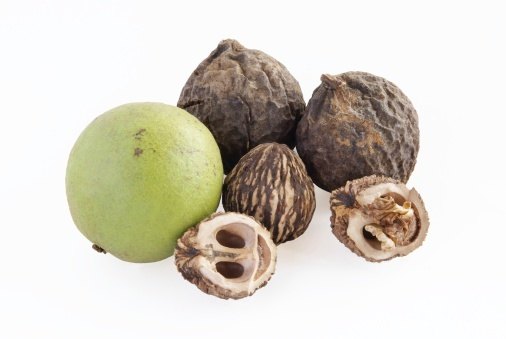
Black walnuts contain a toxin known to cause vascular disease in horses, but has not been shown to cause the same in dogs. However, eating black walnuts can cause gastrointestinal upset or a dangerous obstruction. When moldy, black walnuts can contain tremorgenic mycotoxins which can cause seizures or neurological symptoms.
Verdict: Do not feed.
Brazil Nuts
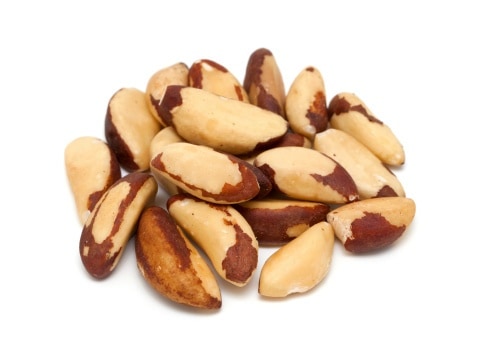
Like almonds, Brazil nuts are not toxic to dogs, but are high in fat and not easily digested. A dog that eats Brazil nuts may experience upset stomach.
Verdict: Ok on occasion, but there are much safer, healthier options available.
Cashews
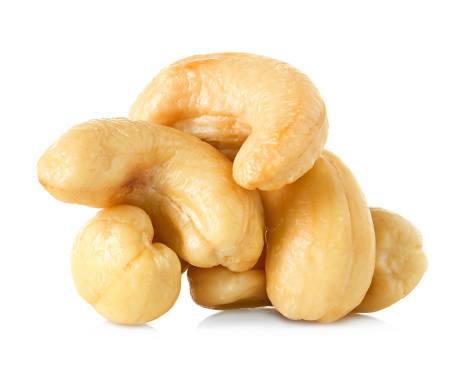
Cashews are not toxic to dogs and are generally safe to feed in moderation – as long as they are cooked or roasted. Raw cashews do contain a toxin that is eliminated through cooking. Because of their fat content, cashews can cause upset stomach.
Verdict: Do not feed raw cashews, but cooked or roasted cashews are generally safe in moderation.
Chestnuts
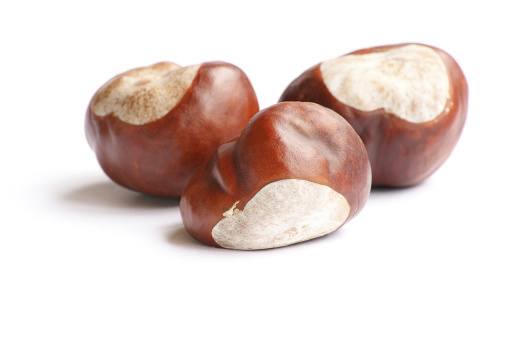
American Chestnuts are not toxic to dogs, however, they can pose a choking or obstruction risk and can lead to gastrointestinal distress when eaten.
Verdict: Ok if ingested, but avoid in favor of better options.
English Walnuts
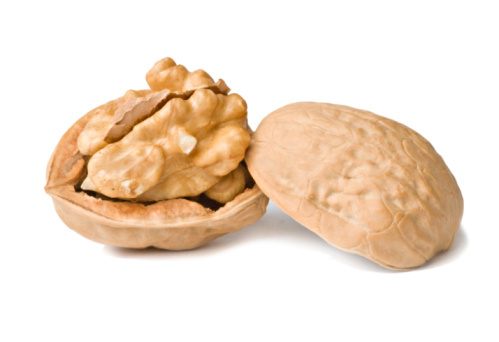
The most commonly snacked type of walnut, English walnuts can lead to upset stomach and gastrointestinal distress or obstruction. Like Black or Japanese walnuts, moldy English walnuts can contain tremorgenic mycotoxins (toxic chemical products produced by fungi) which can cause seizures or neurological symptoms.
Verdict: Do not feed.
Hazelnuts
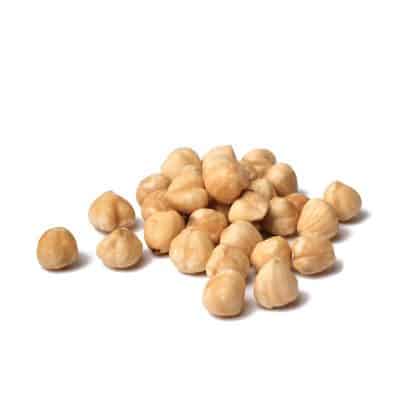
Hazelnuts are not toxic to dogs and are generally safe to feed in moderation. However, because of their size and shape, they can pose a choking or obstruction risk to smaller dogs.
Verdict: Ok to feed on occasion to larger dogs.
Hickory Nuts
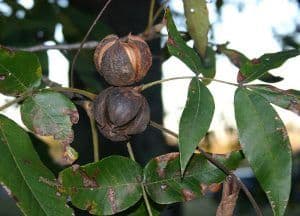
Another nut known to cause laminitis in horses, but not yet proven to cause the same vascular disease in dogs. Hickory nuts can cause gastrointestinal upset or an obstruction. And, like walnuts, moldy hickory nuts can contain tremorgenic mycotoxins which can cause seizures or neurological symptoms.
Verdict: Do not feed.
Japanese Walnuts
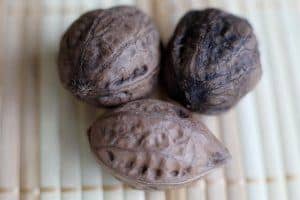
Although Japanese Walnuts are not toxic, they can cause gastrointestinal upset or an intestinal obstruction. Like other types of walnuts named, moldy Japanese walnuts can contain tremorgenic mycotoxins which can cause seizures or neurological symptoms.
Verdict: Do not feed.
Macadamia Nuts
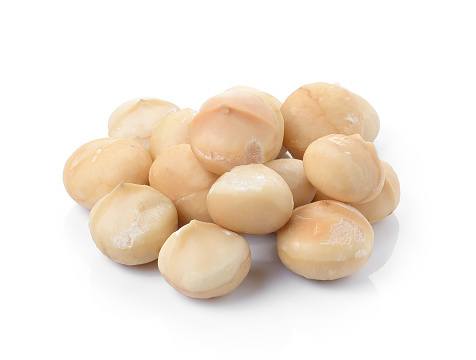
Macadamia nuts are commonly listed as one of the top “human foods” to avoid feeding your dog. These nuts contain an unknown toxin that can lead to neurological issues and are very, very high in fat, which can put your dog at risk for serious gastrointestinal distress or lead to pancreatitis.
Verdict: Absolutely do NOT feed.
Peanuts

Peanuts (which technically aren’t nuts at all but are legumes!) are not toxic to dogs and are frequently used in healthy and safe treats as dogs tend to love the taste. Any peanuts served to your dog should be raw or roasted, unsalted, and without their shells. Peanut butter used as a treat should be natural and only include peanuts without the addition of sugars, salts, or artificial sweeteners.
Verdict: A great treat in moderation.
Pecans
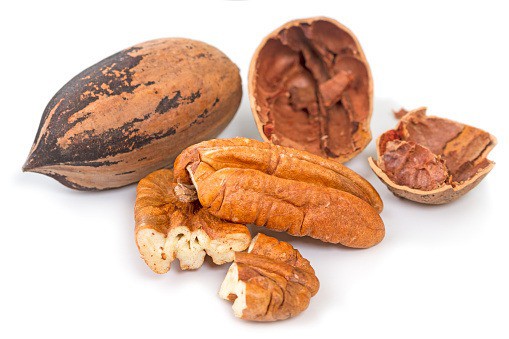
Like walnuts and hickory nuts, pecans have been known to cause laminitis in horses. Feeding your dog pecans can result in gastrointestinal distress or an obstruction. Additionally, moldy pecans can contain tremorgenic mycotoxins which can cause seizures or neurological symptoms.
Verdict: Do not feed.
Pistachio Nuts
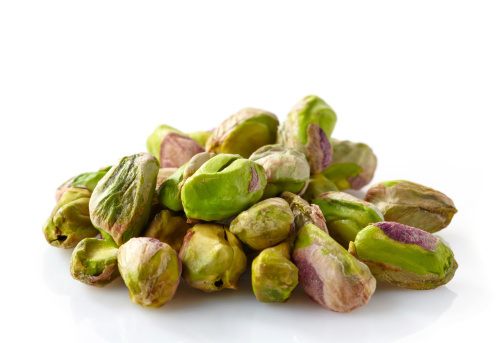
Pistachios, although not toxic to dogs, are another variety of nut which are rich in fat and can lead to upset stomach or pancreatitis.
Verdict: An occasional pistachio, without the shell, is ok, but there are much safer, healthier treats available.
Do you frequently snack on any nuts not mentioned above? Do you have any nut trees in your yard that you’re curious about. Comment the type of nut and we’ll add it to the list!
In the meantime, check out these 10 People Foods You CAN Share With Your Dog!




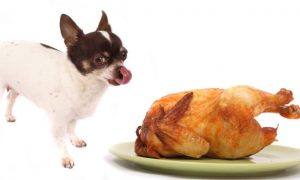

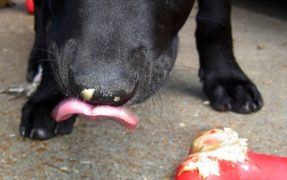















Jimmy & Sabriel
says:My doberman Pitbull loves to eat macadamia nuts pecans and her favorite lately is been Brazil nuts and with everybody considering fat to be bad and have been wrong for years fat is not bad it’s good I don’t know why dogs won’t be able to process fat when they’re a fully carnivore animal their body thrives on fat unless you explain it’s because it’s a plant-based fat?
Brandy Arnold
says:The Brazil nuts are fine to give in moderation. Pecans will usually be ok, also in moderation. But, macadamia nuts are one of the most commonly listed foods to NOT feed your dog. Yes, they are high in fat which could cause pancreatitis, but that’s true of most nuts. The biggest issue with Macadamia nuts isn’t the fat content—that just adds another layer of risk. Like grapes and raisins, the specific toxin or mechanism of biological action found in macadamia nuts that causes the poisoning is unknown.
[…] the matter, curious to give the right answers and give specific prescription, I went on to check on dogingtonpost recommendations on nuts for dogs here and further my research, I found that that piece of info is actually a awesome […]
This is quite an extensive list of peanuts to avoid, but you shouldn’t forget acorns as well. Acorns contain a toxin called Gallotanins that would result to your dogs to have upset stomach or worse, kindly diseases. Read more here: goldenretrieverlove.com/is-it-safe-for-my-dog-to-eat-acorns/
Gayla Bruce
says:I have 4 very large pecan trees in our yard and last year they produced more than six 5-gallon buckets. Our issue is that my Westie, Sealyham Terrier and black Labrador love these nuts and they have chomped on fresh pecans that have fallen. The pecans my pups eat are not moldy and they actually crack the shell and eat the shell & nut-meat. My vet was asked and he assured me that as long as they are not swallowing the nut whole, there's nothing to worry about. My dogs only eat 2-5 a day during the harvesting. My Westie is 2 1/2, Sealy is 18 months, and the Lab is 9. They are all very healthy and happy. I feed a very healthy kibble and give them Greek yogurt, Kefir and organic & coconut oil. Their coats are healthy, teeth have minimal plaque build-up and their eliminations are healthy. Every now and then, I will roast them pecan halves with olive oil. I know my situation is not the same as your situation, but as my vet says, just make sure during pecan season, to keep them hydrated. Water is necessary for digestion. That's my story and I'm sticking to it!
Marty Bick
says:I've read some guff in my time but this goes straight to the top of the list. The mention of fat causing issues, don't make me laugh! Then you advise peanut butter and peanuts. Have you ever wondered why they are top of the list for avoidance? Do some proper research on alflatoxin, a known carcinogen and then throw in lectin….oh and the garbage they put in peanut butter….avoid it personally and definitely do not feed it to your beloved dog! Please don't say "but they love it" it is awful stuff! I have studied human and canine nutrition for over 30 years so when I read advice on peanuts for dogs it makes my blood boil!
Amber Richie
says:My question is can dogs eat maple nuts?
[…] Walnuts and Macadamia nuts – Various nuts contain toxins that could cause vomiting or seizures in your dogs. Not all nuts contain them, but be sure to do your research before feeding nuts to your pup and always avoid walnuts and macadamia nuts. Here’s a guide to nuts for dogs! […]
laura rietdorf
says:Can dogs eat corn nuts
[…] dogingtonpost.com/is-your-dog-nuts-about-nuts-know-the-good-from-the-bad/ […]
Jean Ervasti
says:What about acorns for both dogs and horses?
How about olives? Not a nut I know but I live in Montenegro where there are countless abandoned olive groves. A pack of dogs I occasionally exercise just love the olive windfalls but only once they have dried or rotted to a thinly coated olive stone. It’s the olive stones they seem to love crunching. That said – I’ve never witnessed any bad reaction.
Brandy Arnold
says:Olives are not a known toxin for dogs and, in fact, if any oils remain in these dried olive stones, your pack could actually benefit from eating them on occasion. Just be careful if any of your dogs are small breed as they could be a choking hazard. And, as long as they aren’t feasting on them, they should be perfectly fine to consume. (Some dogs have developed upset stomach from chowing down on olives, but that could have been due to the brining process and not necessarily the olive itself).
The Chihuahua Adventures of Skamperz, Penny, Trooper & Friends
says:My rule of thumb is….NO TREE NUTS WHATSOEVER! Dog peanutbutter only.